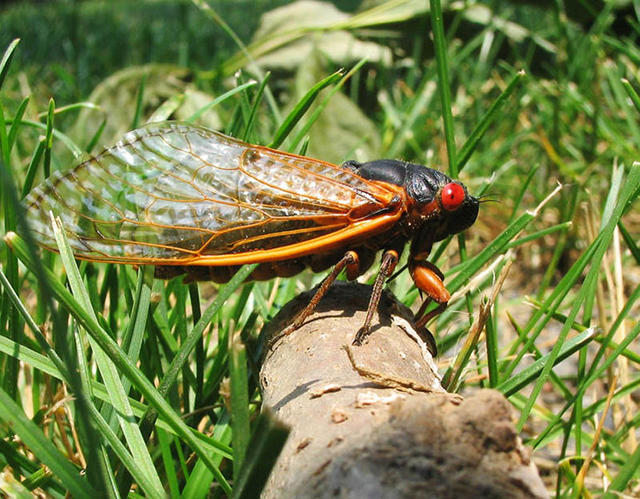Brood X
Billions of cicadas known as Brood X are emerging after 17 years living in their underground world. When will they arrive in Rockaway?! As a gardener, I’m so intrigued with these rare insects. The ground temperature needs to be about 65 degrees to trigger their surfacing. Which was estimated by scientists to be mid-May in New York. It’s the first week of June now and I haven’t seen any on the peninsula. I’m upset!
Cicadas remind me of an alien species from the Delta Quadrant. Brood X has two distinctive red eyes. And an additional three more smaller eyes on their forehead! Photo via wikipedia.org
During their long life underground, these periodical cicadas are feeding on sap from trees and other plant liquids. The cicadas are molting, forming into their adult selves. The insects emerge into our world to mate. A few weeks later their life cycle ends. Speaking of mating, the distinctive buzz that the cicada makes with a special organ (not their wings) is a call from the males, luring their female counterparts. Some people find the constant “white noise” an annoyance, but I like it! One female lays 400-600 eggs, ensuring the next generation survives.
After all, the sheer numbers of them, once above ground, is a rich food source to many animals, including squirrels, birds, wasps and … humans. Yup, cicadas are edible and people collect them for use in salads, smoothies, and tacos. Maybe this year they’ll be the big foodie craze. The obvious next question… What do they taste like? The internet says the taste is “akin to asparagus.” Note, if you are allergic to shellfish, experts warn not to consume them.
So much has changed in 17 years. What were you doing in 2004? I was one year out of college freaking out, looking for a “real job” while working at Michael’s Craft store. Politics has changed, Rockaway has changed, the environment has changed, the world has been turning while Brood X has been living their calm sap-sucking lives below ground. One interesting and disturbing fact I learned while watching a clip online is that infrastructure, especially in NYC, has changed dramatically over this two decade period. And it will affect some cicadas’ emergence. For instance, if the insects went underground at an undeveloped plot of land and now that site is a highrise building. they will not be able to break free. Entomologists are keeping a close eye on this and have mapped out generations of perocials locations, studying the impact on their numbers and movements. Long Island is supposed to be a cicada hot spot, ugh counter urbanization.
Maybe another reason I’m so fascinated by cicadas is a connection I have with them from my childhood. There are many species of cicadas. The more familiar ones are green and larger than the dark, red-eyed periodicals. As a kid, I remember seeing the green iridescents and their light brown shells everywhere during the summer. So much so that my sisters and I created a cicada hospital and research lab one year. There was this kid down the street named Jimmy. He and his friends would pull the wings off the insects and chase us girls with them in hand. My sisters and I would rescue the injured cicadas and make a hospital for them in the canopy of the evergreens in my parents’ backyard. We would bring them water and make them comfortable, “patient on branch two needs a check-up.” I’m sure our efforts were for naught, but our intentions were genuine. If one passed away, my sister dissected it for her “research.” She wanted to be a veterinarian when she grew up (ended up a doctor!). Our Cicada hospital gave me an appreciation and respect for the value of living things, even the smallest of creatures, and this sentiment has stayed with me throughout my life.
It’s clear I’ve been obsessing over Brood X. I wake up every morning hoping to hear a faint buzz, the indicator of their arrival. Please, if you’ve spotted these beautiful insects in your backyard or somewhere in Rockaway, Broad Channel, or Breezy, please get in contact: @theglorifiedtomato on Instagram.

























